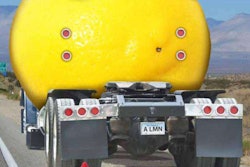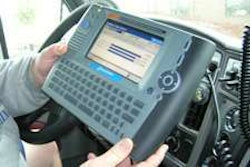A congressional critic of the previous cross-border trucking program with Mexico has demanded the U.S. Department of Transportation justify the planned program.
Rep. Peter DeFazio sent U.S. Trade Representative Ron Kirk a copy of his March 10 letter to DOT Secretary Ray LaHood. The Oregon Democrat asked LaHood to qualify how the plans will comply with federal pilot program rules and cross-border trucking appropriations provisions.
DeFazio also asked what provided the DOT with the authority to utilize the Highway Trust Fund for paying for electronic on-board recorders with global positioning system capabilities it would require for Mexican participating carriers.
Mexican cabinet officials have said once the DOT grants program participants operating authority, the agency can only revoke it for carriers that have breeched road safety, even if Congress votes again to end the program.
Pilot program regulations require the DOT to immediately revoke participation of carriers or drivers not meeting program conditions. The department would not be able to enforce this if Mexican carrier participants have permanent authority after passing a compliance review after 18 months, he said.
“Granting permanent authority to carriers on a rolling basis, and then granting blanket authority to all participants at the 18-month mark, would seem to exceed your authority under the law,” DeFazio wrote.

“Further, carriers who participated in the pilot program DOT launched in 2007 will get credit for the number of months they operated in the U.S. when they re-apply under this new program. This means that some carriers will receive permanent authority almost immediately,” he added.
Obama’s fiscal 2012 budget request allocates $4.3 million from the Highway Trust Fund to implement the program, some of which will be used to buy and install EOBRs for Mexican carriers and pay for monitoring. DeFazio said the agency spent $1.25 million on EOBRs for 27 carriers in the previous pilot program, which the participants kept when Congress ended it in March 2009.
“It is outrageous that U.S. truckers, through the fuel tax, will subsidize the cost of doing business for these Mexican carriers,” he wrote.
Following Mexico’s and the United State’s announcement on reaching agreement on the program, DeFazio said Mexico lacked adequate standards for commercial driver’s licenses, hours of service, and drug and alcohol testing. U.S. companies are unlikely to want to operate in Mexico more extensively because of crime concerns, according to a March 3 statement.
“If we open our borders to Mexican trucks and give them free range in America, American truckers with a decent family wage will lose work to under- or un-qualified Mexican truckers working for a buck an hour,” the representative said.
Congress has not scheduled hearings on program plans, although in January, DeFazio’s and California Democrat Rep. Bob Filner asked for hearings. That month, the House highways subcommittee pledged to monitor the program to ensure truck safety and protect U.S. jobs.










